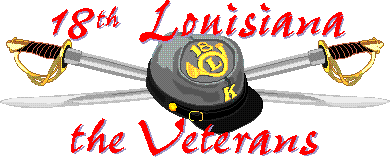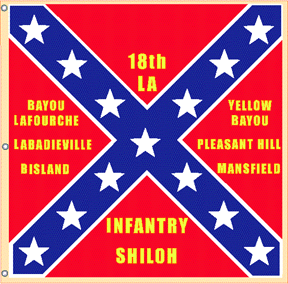Mouton, William, Capt., Major, Co. F.,
Field and Staff. 18th La. Inf. En. Oct. 5, 1861, Camp
Moore, La. Present on all Rolls to Feb., 1862. Roll May and
June, 1862, Absent, sick, since June 19, 1862. Rol July and
Aug., 1862, Present, promoted Major July 19. Roll May and
June, 1863, Absent, sick. Roll July and Aug., 1863, Present.
William Mouton was 1st lieutenant in the
company raised and organized by Capt. Alfred Mouton, and
upon the election of the captain to the colonelcy of the
18th Regiment, he became captain of the company.
He is a native of Attakapas and a lawyer of some eminence
in Vermilionville.
He was gifted with all the qualities requisite for a good
companion at any social gathering, having a pleasing
conversation and possessing notoriety as an orator in either
French, Spanish, or English.
He was almost too good natured to be a strict
disciplinarian or a severe officer and did not take very
kindly to the tactics of Hardee.
On our departure to Corinth in February 1862, Capt.
Mouton was sent with his company as an escort to m 500
prisoners captured at Manassas and confined in New Orleans
for several months, who were being removed to Salisbury,
North Carolina.
He met the command, after having performed this duty, at
Corinth and participated in all the movements in which the
18th Regiment made in front of that place,
participating in the fight at Pittsburg Landing and the
battle of Shiloh. During the siege of Corinth, Capt. Mouton,
owing to sickness of so many officers, was in command of the
regiment for the last 15 or 20 days that we remained in
front of that place. After our retreat to Tupelo, the
captain became major by promotion and was subsequently
elected by the officers to that position when the above
promotion was declared null. Shortly after the retreat from
Corinth, Capt. Mouton obtained leave of absence on account
of ill health and came to his home in Louisiana.
He returned to his command at Pollard, Alabama, but a few
days previous to the reception of orders removing our
regiment to the Trans Mississippi Department. When we
reached Berwick's Bay, the major was ordered to Camp Pratt
near New Iberia for the purpose of obtaining conscripts
sufficient to fill up our regiment. It was during this
period that the campaign on the bayou took place. He was
with his regiment the greater portion of the time in all its
wanderings over Louisiana and Arkansas. He was too unwell to
participate in the battles of Mansfield and Pleasant Hill.
The fall of Col. Armant and the promotion of Lieutenant
Colonel Collins was followed by the promotion of Major
Mouton to be lieutenant colonel, which rank he held until
the surrender at Natchitoches.
After the surreder, he resumed the practice of law in
Vermmilionville, but afterwards removed to New Orleans. He
has, however, returned to his old home in the prairies and
is now in tine vigor of manhood with the prospect of many
happy days before him.
The colonel will no doubt remember ore evening in front
of Corinth when our regiment was ordered out on the
Farmington road and placed in front of the enemy. The whole
army was drawn up in line of battle along the skirmish line.
Sickness had reduced the regiment to a few men. The major
was in command and I, a 1st lieutenant, was second, which
fact will give an idea of the condition of our
effectiveness. Night came, and about 11 o'clock the major
and myself made our couch in an empty wagon, which was done
by spreading our blanket on the floor and another on
ourselves. We conversed a long time on the prospect of the
next day's chances and wondering where our bed on the
following night would be, finally dropped asleep. When we
awoke, the sun was up; I remarked "that everything was
quiet, and it did not look much like there was going to be a
fight." "Well, Lieutenant, let's get up and try and get one
more cup of coffee before the ball opens." We did so, and
lay around in the shade all day, when we were sent back to
camp.
At another time, our men, who were in camp, were nearly
all unwell, and about half of them were on duty every day;
the major, having been over to see Gen. Ruggles'
headquarters, told me that he had obtained a few days' rest
for his men. We were congratulating ourselves on this
pleasant information when an orderly rode up and presented
the major with an order to remove his whole regiment out on
picket that evening on the Monterey road. A sweet time we
had that night with the minnie balls passing through the
trees and whistling around our ears every few minutes.
The next day, I was sent by the major to accompany Major
Newman of the 21st Regiment and Lt. Levi Hargis to ascertain
why there was no connection between our pickets and that on
our right. We soon found the reason and ascertained how much
pleasure a man can have in being deliberately shot at by one
of his own friends&emdash;and missed.


